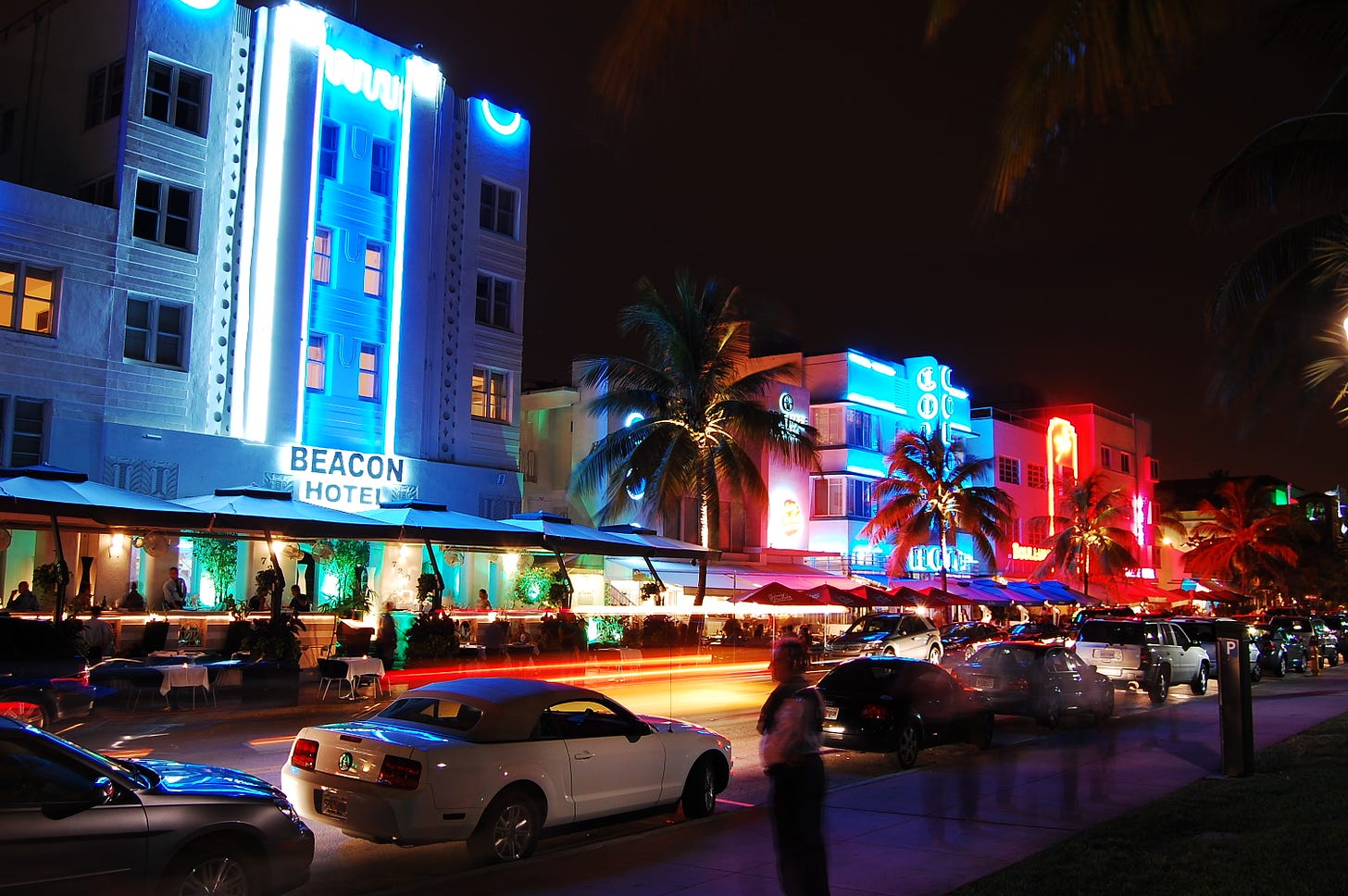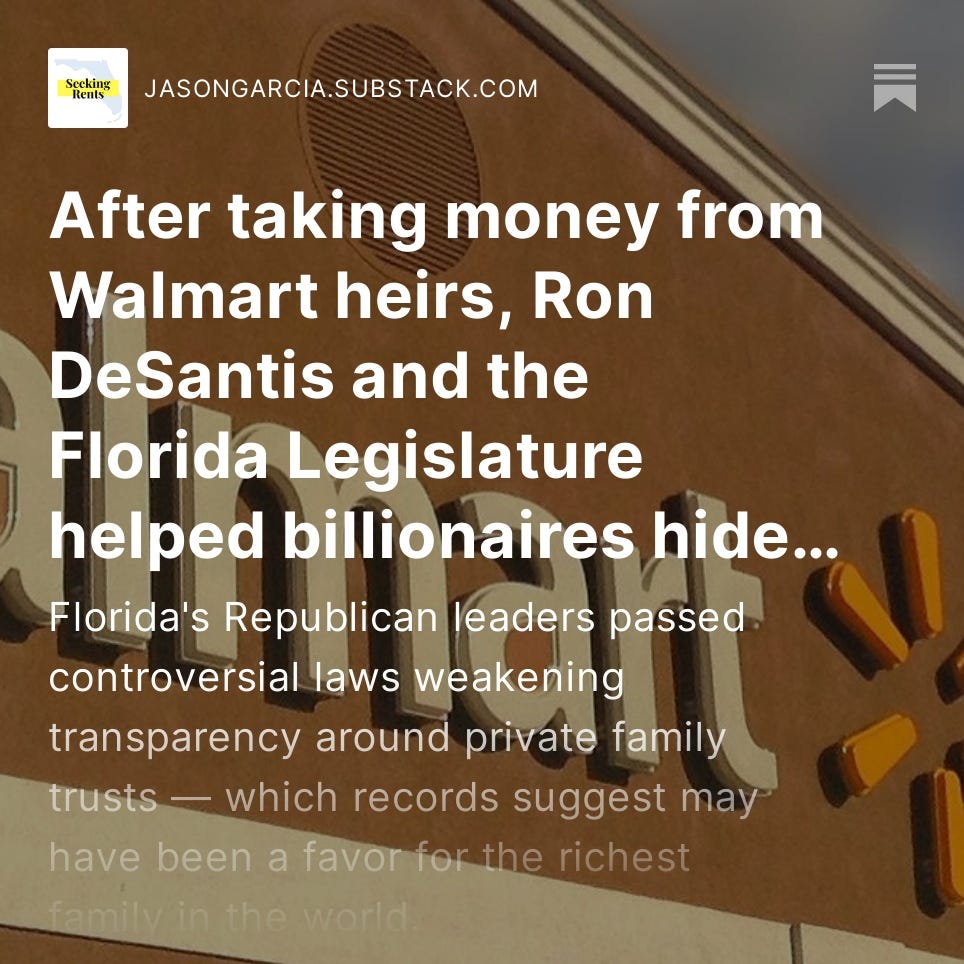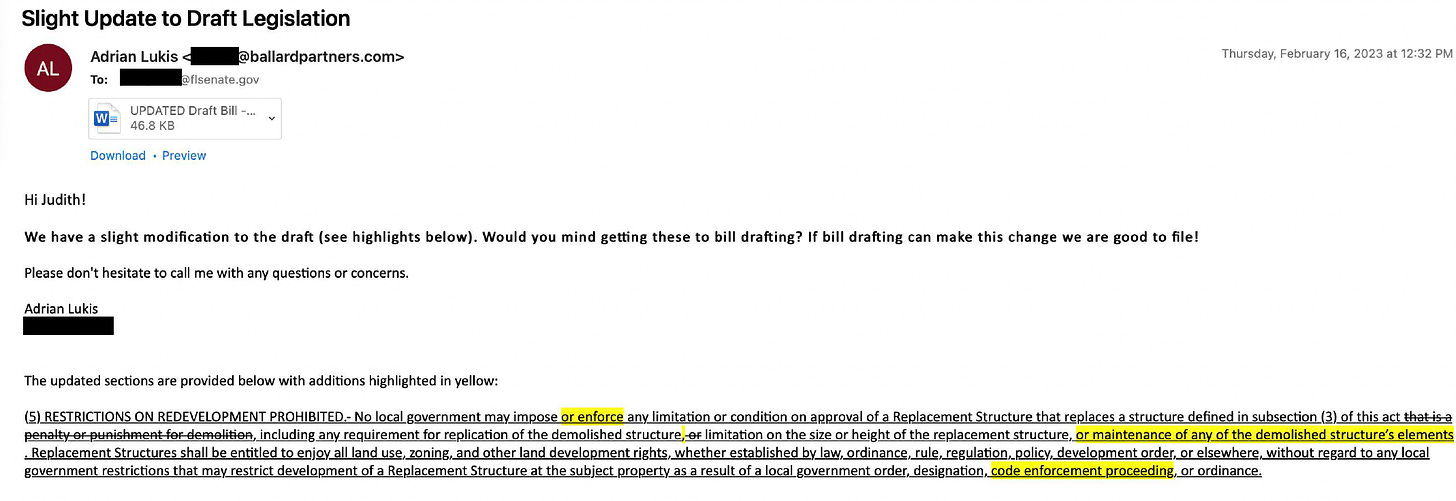Dark lobbying in the Florida Legislature
A bill in Tallahassee would have helped developers bulldoze historic buildings in Miami Beach. Everyone knows which lobbyist wrote it. No one knows who he was working for.

This is Seeking Rents, a newsletter and podcast devoted to producing original journalism — and lifting up the journalism of others — that examines the many ways that businesses influence public policy across Florida, written by Jason Garcia. Seeking Rents is free to all. But please consider a voluntary paid subscription, if you can afford one, to help support our work.
During this year’s session of the Florida Legislature, state lawmakers nearly passed a controversial bill that would have made it much easier for real-estate developers to bulldoze older buildings in Miami Beach — a city famous for both its Art Deco architecture and its strict historic-preservation rules.
Nobody knew at the time who was behind the bill. But emails obtained through public-records requests show that the legislation was given to lawmakers by a lobbyist at Ballard Partners, a firm run by one of Florida’s biggest Republican Party fundraisers.
Ballard Partners has many clients. One of them is The Related Group, a condo developer led by the billionaire real-estate mogul Jorge Perez. And it just so happens that The Related Group recently tried, and failed, to redevelop a nearly 60-year-old condo tower in Miami Beach, according to The Real Deal, a real-estate news publication.
That’s not all. One of The Related Group’s partners in that aborted Miami Beach project, according to The Real Deal, was another developer called 13th Floor Investments. And one of 13th Floor’s companies gave $10,000 each just before the legislative session started to the two legislators who filed the bill that Ballard Partners gave them.
But Ballard Partners says it was not working on the Miami Beach demolition bill on behalf of either of those South Florida firms. Nor, it says, was it representing any other developers on the issue.
Instead, in public disclosure forms required by the state House of Representatives, the lobbying firm says that its client on the bill was a new nonprofit organization called “A Resilient Future Florida Inc.”
A Resilient Future Florida Inc. was incorporated by an elections attorney in Tallahassee one day before this year’s session began. It does not appear to have a website, nor has it engaged in any kind of public-facing advocacy.
And it is based in Jacksonville — even though state Sen. Bryan Avila, a Republican from Hialeah Gardens who sponsored the Senate version of the bill, told his fellow senators during the session that the “origin of this piece of legislation is mostly from South Florida, particularly in Miami-Dade County.”
A Resilient Future Florida apparently hired Ballard Partners on the very day it formed, and records show it has paid the firm at least $50,000 so far in lobbying fees. But because it is a nonprofit, it does not have to disclose its donors. An attorney for the group would not reveal its donors, either.
Representatives for Ballard Partners, The Related Group and 13th Floor did not respond to questions. And the two elected lawmakers who agreed to carry the group’s bill in the Legislature either don’t know who is behind it — or won’t say.
“I never worked with, spoke to, met with or had any direct interaction with any members of that organization or donors of that organization,” said Rep. Spencer Roach, a Republican from North Fort Myers who sponsored the House version of the bill. “Nor am I even aware of who the members are or donors are, as that information is not required to be disclosed.”
Avila would not answer any questions at all.
As a result, it’s impossible to say with any certainty who was truly trying to push this bill through Tallahassee.
Which is exactly the point. A Resilient Future Florida is, by all appearances, little more than a client-laundering organization. It appears to exist solely to hide the identities of whatever developers are so desperate to start knocking down old buildings in Miami Beach.
Client-masking in the Florida Capitol
This is basically dark lobbying. And it’s happening more and more in Tallahassee.
In the fall of 2019, for instance, an estates attorney at a high-end Manhattan law firm formed a new nonprofit called the “Florida Coalition for Modern Laws Inc.”
Just like A Resilient Future Florida, the Florida Coalition for Modern Laws immediately hired Ballard Partners. Public records show that Ballard lobbyists then sent three pieces of legislation to lawmakers to file on the Coalition’s behalf, which the firm subsequently lobbied through the Legislature.
The bills, each of which Gov. Ron DeSantis signed into law, made it easier for superrich families to hide their wealth from the public — and from federal taxes.
The nonprofit shut down last year, shortly after the last of its bills passed. Tax records show it ultimately raised just under $350,000 for the effort — at least a third of which it spent on lobbying fees for Ballard.
It never disclosed its donors — although corporate and campaign-finance records suggest that it may have been created on behalf of the Walton family, the billionaire heirs to the founder of Walmart Inc.
Similarly, in November 2021, a former official at the Heritage Foundation, a national conservative think tank, created a new nonprofit called the “Council on Public University Reform Inc.”
It, too, quickly hired Ballard Partners, which then lobbied the Legislature and DeSantis administration to spend millions of dollars setting up a semi-autonomous, conservative-leaning college inside the University of Florida.
Records show the Council on Public University Reform was started with $90,000 in seed money and that it has paid Ballard Partners at least $60,000 so far in lobbying fees. But there’s no indication yet of where the Council got that money.
Of course, there’s a long history of businesses and other special interests enlisting — or even inventing — nonprofits or other seemingly civic-minded organizations to publicly lobby in support of their agenda.
For instance, as Florida’s Big Sugar companies have fought new federal rules controlling water levels in Lake Okeechobee, one of the organizations that spoke out on their behalf was called “Our Water Our Rights. Corporate showed that it was created by consultants working for sugar giant Florida Crystals.
And when the engineering firm Power Design was lobbying last year for a bill that would have let the company and other government contractors pay lower wages to their workers, an obscure nonprofit testified in favor of the bill, too. Lobbying records showed that nonprofit was based out of Power Design’s headquarters in St. Petersburg.
But these other nonprofits — A Resilient Future Florida, the Florida Coalition for Modern Laws and the Council on Public University Reform — are something different.
They don’t exist to make it look like there is broad public support for some special interest’s agenda. They exist to hide that special interest entirely — whether that might be a big condo developer, a billionaire family or someone else.
Stage-managing from the shadows
The lobbying behind this year’s bill to help developers demolish more buildings in Miami Beach was especially opaque, according to the emails and text messages obtained in public-records requests. (The records turned up through a pair of requests — one submitted by Seeking Rents, the other by McKenna Schueler, a reporter at the Orlando Weekly newspaper who covers housing and labor policy.)
For instance, though he never testified in public, those emails and texts show that one lobbyist was largely orchestrating the legislation in private: Adrian Lukis, a former chief of staff to Gov. Ron DeSantis who jumped to a lobbying job at Ballard Partners about a month after leaving the Governor’s Office. (Ballard Partners is run by longtime Florida Republican rainmaker Brian Ballard, who is now one of DeSantis’ biggest fundraisers.)
Lukis sent in the original version of the bill to both the House and the Senate. He provided both chambers with language for further changes that were made as the bills advanced. And he gave the two lawmakers sponsoring the bills talking points to use when discussing it — which Avila, the Senate sponsor, would read, nearly word-for-word, while presenting the bill in public hearings.

The legislation drew intense opposition from preservationists and local government officials, who warned that it would shred protections for historic buildings in coastal communities across Florida. But when other interest groups proposed changes to Avila, the records show that his office would immediately send them to Lukis for his approval first.
Under rules set by the Florida House of Representatives, lobbyists working on a particular issue or bill are supposed to disclose the specific client they are representing. But Lukis did not report any clients on the bill during the legislative session, which ended in early May. He only identified A Resilient Future Florida Inc. as his client on the bill this week, after inquiries from Seeking Rents.
The records also show that Lukis was working on the bill by Feb. 16 of this year — which was 18 days before A Resilient Future Florida was formally created. (Natalie Kato, an elections attorney in Tallahassee who represents A Resilient Future Florida, said that the group’s board voted to incorporate on Feb. 16, even though the state did not approve its filings until March 6.)
The lobbying campaign was ultimately unsuccessful. But it came very close: Despite the opposition from historic preservationists and local governments, the bill breezed through the Senate on a bipartisan vote before falling just short in the state House.
And Roach, the House sponsor, said earlier this year that he intended to re-file a version the bill again during the next legislative session, although Roach said this week that he has not made a final decision. The Florida Legislature’s 2024 session begins in January.









So much for government in the sunshine...
You couldn’t pay me enough money to live in that misbegotten, hell-hole of a state. Miami Beach used to be a great place to visit for the architecture and great food but between DeInsanity, the money hungry lobbyists and real estate developers the stupid state is liable to either drown, drop into a massive, never ending sink hole or drop off into the Straits of Florida.